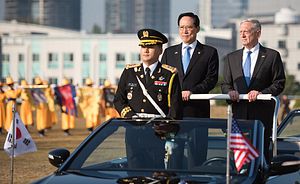On January 29, while delivering a major speech in Singapore, South Korean Defense Minister Song Young-moo suggested holding a forum for maritime security in Northeast Asia later this year. Though Song did not provide much in the way of specifics, the proposal bears noting given that 2018 constitutes a big year for South Korean defense issues, including in the maritime security realm.
Song’s keynote address, delivered to the sixth annual IISS Fullerton Forum, which helps set the stage for the Shangri-La Dialogue – Asia’s premier security forum – covered a range of security issues in the Asia-Pacific. Though there was an unsurprising emphasis on North Korea, which Song called the most serious immediate threat for Asian security, he also devoted attention to other areas, including maritime security, noting Seoul’s role as the co-chairman of the ASEAN Defense Ministers’ Meeting-Plus (ADMM-Plus) working group on maritime security and its holding of the International Fleet Review later this year.
But in terms of new proposals, the one that stood out was Song’s suggestion of a new Northeast Asia forum on maritime security. Specifically, in his speech, Song proposed the holding of a forum “for maritime peace and order” in Northeast Asian waters, initially featuring the navies of South Korea, the United States, Japan, China, and Russia. Though this would be the initial group of countries involved, Song went on to suggest that if the forum would continue to develop, it could eventually expand “not only to the entire East Asia, but also to the Southeast and Southwest Asia.”
Song did not provide much more in the way of detail about the new body, which makes it difficult to assess the idea at this stage. But it is hardly the first new body that has been proposed by Asian states to deal with peace and security, including maritime security, where, as Song noted, there are a whole range of issues to contend with including piracy, maritime pollution, freedom of navigation, and fisheries. To take just one example, back in 2015, for instance, there was talk coming out of Japan about a new grouping called the Asia Maritime Organization for Security and Cooperation (See: “Does Asia Need a New Maritime Security Organization?”).
Song’s proposal is notable when seen in the context of Seoul’s increased willingness to contribute to regional security issues, particularly amid concerns that it can at times be too myopically focused on the North Korea threat. The new administration under President Moon Jae-in has certainly been emphasizing Seoul’s efforts in this realm, including not just its peacemaking role beginning with the Pyeongchang Winter Olympics next month but also other efforts such as boosting ASEAN-South Korea relations, which Song also touched on in his remarks (See: “Should North Korea Be Kicked Out of the ASEAN Regional Forum?”).
But, like previous proposals of its ilk, Seoul’s proposal also raises several familiar questions. The need for yet another new institution is itself a debatable proposition, given the alphabet soup of organizations already in existence in the Asia-Pacific – including on maritime security – as well as concerns that it might raise about diluting ASEAN’s much-prized centrality in the regional architecture (though some still argue that it is exactly the slow pace of ASEAN-led regionalism that demands new groupings, especially in the security realm).
The biggest question, though, is to what extent such bodies can actually help manage disputes between major powers in Northeast Asia. For a mix of reasons including history, outstanding disputes, and geopolitical competition, relationships in Northeast Asia have not been conducive to the kind of multilateralism we have seen in Southeast Asia, which helps explain how ASEAN arrived at its centrality by default. Of course, dialogues are important to build confidence and provide a common set of understandings for all actors, and other measures like hotlines can be useful to manage tensions when crises break out. But the fundamental challenge in Northeast Asia is not the absence of groupings or dialogues, but managing old disputes and tensions in a fast-changing context, including a bolder and more assertive China and a nuclear North Korea.
Of course, one should not rule out the possibility that new forums or mechanisms like the one Song proposed could play some kind of a role, however small, in helping better manage these tensions. More broadly, as Song suggested in his speech, the Moon administration may want to initially test the extent to which it can go beyond just keeping the peace and try to help making the peace as well (Song used the word “peace” 21 times in his speech, which lasted around 17 minutes). At the same time, given the dynamics at play in Northeast Asia and past efforts at such peacemaking, there are no shortage of reasons to be skeptical about the degree to which any progress would contribute to actually changing the more fundamental geopolitical realities in the region.

































